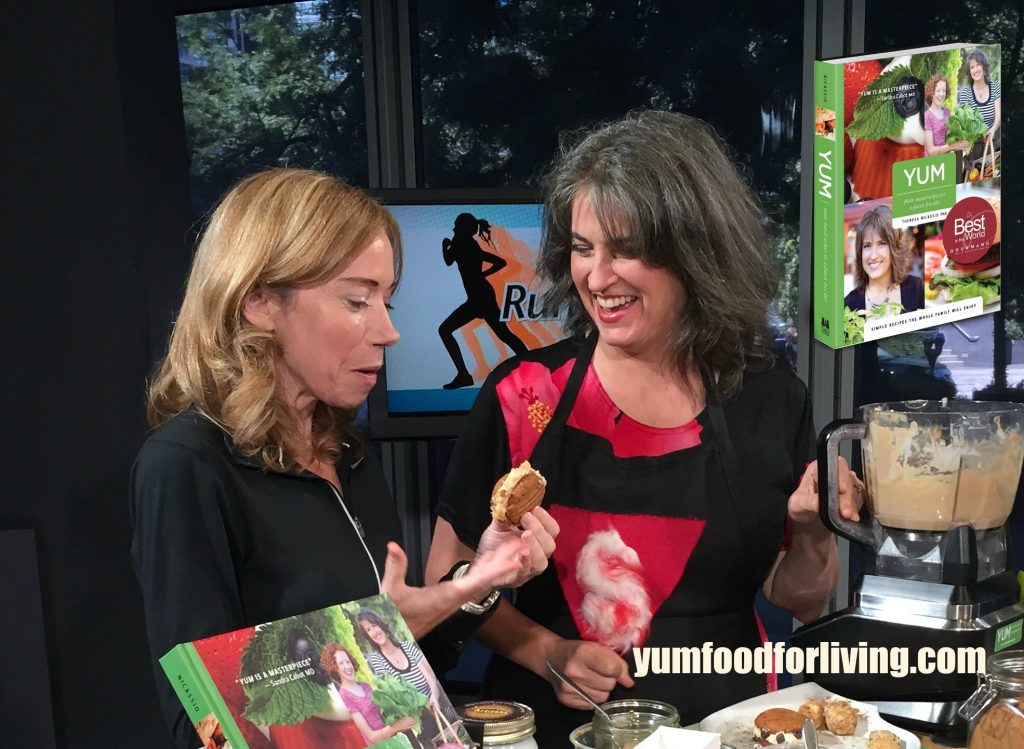Dr. Theresa Nicassio is a registered psychologist in Vancouver and the author of the award-winning cookbook, YUM.
This week in part one of a two-part series, Dr. Nicassio talks about healthy eating tips for older adults.
I asked what advice does she have for older adults when it comes to healthy eating?
Her answer contains enough information to get you started on a journey to healthier living, with more to come…
Because each of us is different physiologically, what each of our bodies need for nourishment or healing can vary greatly. That said, there are certain principles that are universal for all of us as human beings.
As we get older there is a cumulative effect of the years that makes the importance of following these principles even more important, especially to support the health of your heart and brain, as well as your overall sense of vitality.
I would say that the four most important things to focus on are water, fats, nutrients, and your microbiome.
- WATER
Because the majority of our body is made up of water, ample hydration is crucial for our body to function optimally and also to help it cleanse out waste products.
The tissues and organs in our body need fluid to slide and glide with ease and carry out their metabolic and other functions.
When they become dry, friction and stickiness is created, impairing internal movements and functioning.
Depending on your inner landscape and health needs, the amount of hydration needed for optimal health and healing may vary.
For example, those with kidney challenges need to be particularly careful about their water intake because their fluid retention and excretion process may be altered.
The great news is that improving your hydration is not limited to drinking water and herbal tea. In fact, when you consume water-dense plant foods, you can get many of your hydration needs met and in a way that your body can easily absorb and utilize.
Some of my favorite water dense foods are cucumbers, lettuce, celery, squash, cabbage, apples, citrus fruits, onions, and even mushrooms.
- FATS
Contrary to popular belief a few years ago, the importance of healthy fats, especially for neurological functioning, has become a very big topic of discussion in the health community.
We now know that omega-3 fatty acids and fats from foods like avocados and olives are health promoting.
With the brain tissue itself being almost 2/3 fat and the myelin sheath around all of the nerve fibres that run throughout the body, insulating them and supporting the electrical conductivity of the nervous system is largely also made up of fats.
- NUTRIENTS
Many people are either not eating the nutrients that their bodies need or may be eating all the right foods but their bodies are unable to metabolize and properly absorb the nutrients that they need.
The recent discoveries in the fields of Nutritional Psychology and Nutritional Psychiatry have been unveiling many correlates of nutritional deficits and mental health challenges.
Again, consultation with a Functional Medicine doctor can be helpful for assessing what your nutritional needs are and how to properly address them.
All that said, eating foods that are free of pesticides (which can be a significant contributor to metabolic disruptions (including intestinal hyperpermeability, aka “leaky gut”), as well as brain health issues and other challenges, is something that you can do, as well as filling your plate with as diverse an array of nutrient dense vegetables and fruits.
Also, learning and avoiding the foods that create inflammation in your body, whether it’s sugar, gluten, dairy, soy, potatoes, tomatoes, eggs, or any other food that your body is uniquely sensitive to can be very helpful as well.
- FEED YOUR LITTLE FRIENDS
As we have recently learned, each of us has more life forms in us than we have human DNA.
While scientists are still trying to understand the ins and outs of how our microbiome works and the specific bacterial strains important for our health, the one thing they do seem to agree about is the value of including fermented foods in your diet and the importance of feeding those microorganisms with prebiotic fibre.
Finding ways to eat prebiotic-rich foods like onions, apples, garlic, flaxseeds, seaweed, bananas, jicama, asparagus, chicory root, and oats are a great way to take care of the microbes in your body that need nourishment as much as you do.
In next week’s column Dr. Nicassio discusses what older adults should eat for best results pre and post workout.
Fitness Friday is submitted each Friday by Christine Blanchette who you can follow on Twitter as well as her YouTube Channel.
Enjoy the weekend and STAY SAFE!!!









